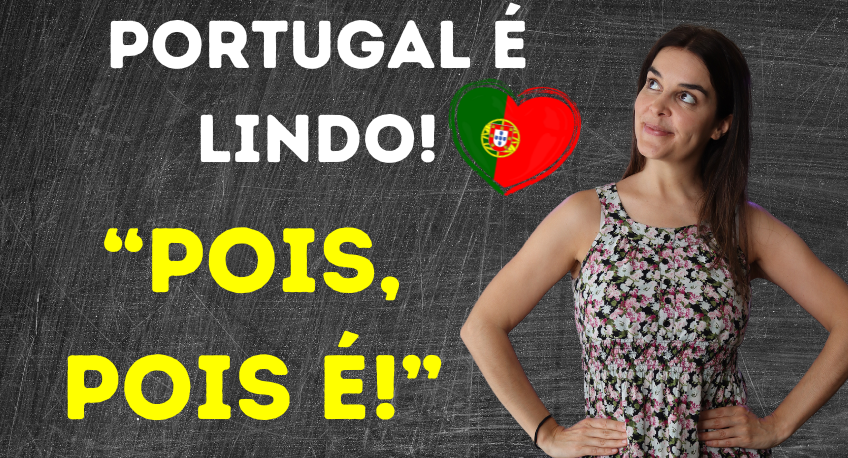Olá! Today I’m going to talk to you about the meaning of a small, but very powerful word – the word POIS in Portuguese.
If you are in or have ever been to Portugal, you’ve almost certainly heard someone use “pois”. The Portuguese tend to repeat this word over and over, and not always in its most literal sense! It actually has many meanings, so stick around because I’m going to explain everything to you!
The most basic or literal meaning of the word POIS in Portuguese
You’ve probably already heard that, in Portuguese, “pois” can be a synonym for “because” (porque).
Let’s see an example: “Não fui à festa, pois estava cansado.” (I didn’t go to the party because I was tired.)
But, in this video, I want to talk to you about the other uses of the little word “pois”.
In fact, “pois” has many more meanings and uses! So let’s explore them:
POIS as confirmation or agreement
“Pois” can be used to confirm what someone is saying or to agree with someone. It’s more or less a synonym for “exatamente” in Portuguese or “exactly” in English. We use this simple little word to agree with what the person is saying, and also to let them know that we are listening (although that’s not always true haha).
For example:
A: “Acho que precisamos de mais tempo.” (I think we need more time.)
B: “Pois, concordo!” (Exactly, I agree!) or simply “Pois!” (Exactly!)
POIS to change the conversation in Portuguese
“Pois” can also serve as a transition to another conversation, to put an end to the previous conversation.
It’s usually followed by “but”, as in the example:
“Pois, mas voltando ao que estávamos a discutir…” (Yes / Right / Sure, but going back to what we were discussing…)
POIS in Portuguese as emphasis
Finally, this word can also be used to emphasize responses and conversations.
Like this:
A: “E agora? Ela vai saber que nós estamos aqui!”
(And now? She will know that we are here!)
B: “Pois!” (Indeed!)
Common phrases with POIS in Portuguese
In the previous example, the response could also have been “Pois é!” instead of just “Pois!”.
Like this:
A: “E agora? Ela vai saber que nós estamos aqui!” (And now? She will know that we are here!)
B: “Pois é!” (Indeed!) Or we could also say: “Pois vai!”
When we want to agree with a positive statement, we often say:
“Pois é.” (That’s true. / It is.)
Or a variation of this phrase, using the verb in the sentence we’re agreeing with:
For example: “Ele comeu muito ao almoço hoje!” (He ate a lot today at lunch!)
“Pois comeu!” (Indeed, he did!)
If the sentence we’re agreeing with is negative, however, we’re more likely to say:
“Pois não.” (Of course not.)
Example:
“Ele nunca mais chega!” (He is taking so long to arrive!)
“Pois não!” (Indeed!)
In this case, we could also say “Pois é,” and you’ll probably hear it, but it’s not as common or as correct.
Tips to use POIS in Portuguese correctly
Using the word “pois“ like a native isn’t always easy, especially if you’re encountering this word for the first time. But here are some tips that might help you:
- Pay attention to the context: Pay attention to the context in which native Portuguese speakers use “pois“. This way, it’ll be easier to understand its meaning.
- Practice with examples: Try using “pois“ in your sentences. For example, create a scenario where you’re agreeing with someone and use “pois“ instead of “exatamente”.
- Notice the tone: The tone in which the word “pois“ is used can change its meaning, so pay attention to how it’s used in conversation.
For example, if the tone is more like “Pois, pois“… then we’re being more sarcastic, and we don’t really agree with the person.
If the tone is “pois,” then we’re more enthusiastic.
If it’s “pois,” we might be implying that we’re disappointed or sad.
And the list goes on…
Another thing you should understand is that “pois“ can be used in different ways. Alone, repeated once, twice, or more. On the phone, for example, when we’re just being good listeners (or pretending to be), we can have long conversations just responding with “pois.”
Like this: Pois, pois. Pois! Pois, pois. We just have to change the tone according to the situation to show the different facets of this very versatile and powerful word.
So, if you don’t know what to respond to something, you can always say “pois.” You just have to make sure the tone is right and you’re good to go!
Like Pierre Zago (Portuguese Comedian) did in this video:
Well, that’s it! We’ve reached the end of this post. I hope you didn’t just read it and say “pois, pois” without paying attention!
If you want to learn more Portuguese with me, I invite to check out my free 5-Day Portuguese Challenge here.
Kisses, and see you in the next video!
Beijinhos, Mia.
Poooisssssss!


Ola Mia would you like to go for beer/sangres